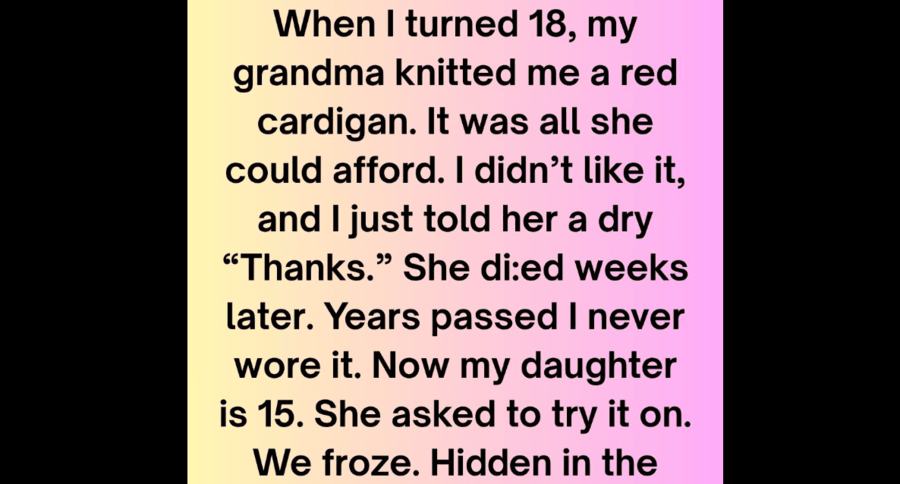When I turned 18, my grandma, Luzviminda Castro, crafted a red cardigan for me with her own hands. It was all she could manage to give. I didn’t care for it, offering only a curt “Thanks” in response. She passed away weeks later. Years went by, and the cardigan remained unworn in my closet.
Now, my daughter, Mila, is 15. One day, she asked to try it on. We both paused, stunned. Tucked inside the pocket was a note—a small, yellowed square of paper. My fingers trembled as I pulled it out.
Mila stood there, holding the cardigan up to the sunlight, her dark curls cascading over her shoulders. “What’s that?” she asked softly, her voice barely above a whisper.
I didn’t respond immediately. Unfolding the paper, I recognized Grandma’s handwriting—those loopy, slanted letters penned in her signature blue ink.
The note read:
“When you find this, it means you’ve finally slipped this old thing on. I’m sorry I couldn’t give you more. But I left something for you. Check under the floorboard, third plank from the corner, in the sewing room.”
My eyes widened. My throat tightened. Mila leaned closer, murmuring, “What does it mean?”
I hadn’t returned to Grandma’s house in over a decade. It was sold after her death. I didn’t fight to keep it or help clear it out—my mom and aunt handled everything. Back then, I thought, what’s there to care about? It’s only an old house filled with doilies and mothballs.
But now, something stirred deep within me.
“Where was her sewing room?” Mila asked.
“Upstairs,” I replied slowly. “It always smelled of lavender and dust. She’d spend hours there, stitching buttons onto clothes no one wore.”
My husband, Tuan, walked in then, noticing us on the floor with the cardigan and note. After I explained, he studied me and asked, “Do you want to go see?”
I hesitated. The house was in Yarmouth, two hours away. I’d heard it was now a short-term rental.
“I think I need to,” I said.
We set out Saturday morning. I messaged my cousin, Imara, who still lived nearby, asking if she knew the owners. “Yeah, a couple from Toronto,” she replied. “They rent it out in summer, but it’s empty now.”
With some luck and Imara’s help, we got the lockbox code. The owners, intrigued by my “family history” story, allowed us an hour inside, as long as we didn’t disturb anything unnecessarily.
I steeled myself as we pulled into the gravel driveway.
The house looked unchanged.
The hydrangea bush out front had grown taller, wild and untamed, but the porch swing still hung in place. The white paint on the railings was chipped. Stepping onto the porch, I felt a weight settle in my chest.
I hadn’t thought of her voice in years. But suddenly, I recalled how she’d hum soft Tagalog songs while cooking, melodies I never understood.
The door creaked as it opened. The air carried a faint scent of wood polish, dust, and herbs. The new owners hadn’t altered much.
Mila followed, clutching the cardigan like a shield.
The sewing room was still there—top of the stairs, second door on the right.
Same faded curtains. Same small stool by the window.
The floor groaned under my steps.
“Third plank from the corner,” I whispered.
I knelt, running my fingers along the wooden floor. Mila crouched beside me, watching intently. The third plank felt slightly loose, enough to slip a fingernail beneath. Using my keys, I pried it up.
Beneath was a small tin box, painted blue with delicate white flowers.
My hands shook as I lifted the lid.
Inside was a bundle of cash, secured with thick rubber bands—faded bills, likely thousands of dollars. Next to it, a velvet pouch. I opened it carefully, revealing a rose gold ring with an opal at its center, framed by tiny sapphires.
“Whoa,” Mila breathed.
There was another note.
“For you, my brightest star. This was my wedding ring. I stopped wearing it after your grandfather passed. I wanted you to have it. You never saw how much I loved you. You’re like I was—strong, sharp, stubborn. Don’t hide your softness, either.”
My breath hitched.
I stared at the ring, the cash, and her words.
All those years, I thought the cardigan was a simple, inexpensive gift. I didn’t see it as a vessel for something profound—something she couldn’t say aloud.
I took the box and left everything else untouched.
At home, I placed the ring on the windowsill. I wasn’t ready to wear it. It felt too heavy, too full of meaning I hadn’t yet earned.
In the weeks that followed, Grandma filled my thoughts. Memories surfaced: her hot chocolate made with condensed milk, her gentle scolding when I rolled my eyes.
One day, Mila walked into the kitchen wearing the cardigan. I nearly asked her to take it off. But seeing her wrap her arms tightly around herself, as if it warmed her soul, I stopped.
She asked, “Why didn’t you ever wear it?”
I answered honestly. “I thought it was ugly. I was 18 and foolish. I didn’t see its value.”
Mila didn’t judge. She nodded and said, “It’s cozy. I like it.”
A week later, I called my mom.
Our talks had been shallow lately, but I asked about Grandma.
She sighed. “She loved you so much. You two were more alike than anyone in the family. But you pulled away after high school. She didn’t want to push you.”
I let that sink in.
Then I did something I hadn’t done in years—I visited her grave.
The stone was simple: Luzviminda Castro, 1932–2006. Beloved mother, grandmother, friend.
I sat in the grass and apologized. I should’ve looked deeper, listened better, worn the cardigan, even if it wasn’t my taste.
I left the velvet pouch by her stone.
But I kept the ring.
Soon after, Mila had a school project on family history. She asked to include Grandma Luz and even brought the cardigan to class.
Her teacher called me weeks later.
“Your daughter’s presentation was so heartfelt,” she said. “She spoke about legacy and hidden love. It touched many of us.”
Something changed that day.
I realized love doesn’t always shout. It’s not always picture-perfect or grand. Sometimes, it’s quiet—woven into fabric, tucked into pockets, hidden under floorboards.
And sometimes, we don’t see it until we’re ready.
That cardigan, simple acrylic and all, is now my most treasured possession.
The money? I put most of it into a savings account for Mila. We kept some for a trip to the Philippines, where Grandma was born—a journey she always hoped I’d take.
That trip transformed us.
We met cousins I never knew existed. We visited the church where Grandma married Grandpa. At a small street market, an elderly woman sold opals like the one in her ring.
Mila used her own money to buy a necklace there, saying it felt like carrying Grandma with her.
Before leaving the island, we visited a small beach Grandma once wrote about. We watched the sunset, the waves gentle and warm.
Mila said, “It’s strange. I feel like I know her now.”
I nodded. “Me too.”
Perhaps that’s the truth. Perhaps love endures beyond us.
Even when we falter—when we’re ungrateful, unaware, or careless—it waits. Tucked in pockets.
Now, when someone gives me something handmade, I look closely.
I know what it’s like to nearly miss the most meaningful message of all.
If something seems small, look again. Love often hides in plain sight.
Please share this story if it warmed your heart—and don’t forget to wear the cardigan. 💌




